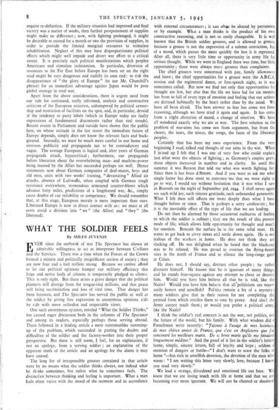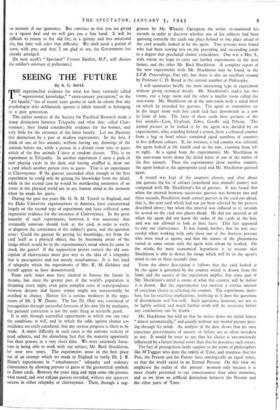WHAT THE SOLDIER FEELS
By MILES JUVENIS
One such anonymous opinion, entitled " What the Soldier Thinks," has caused eager discussion both in the columns of The Spectator and among, its readers, especially perhaps those serving abroad. There followed in a leading article a most statesmanlike summing- up of the problem, which succeeded in putting the doubts and difficulties of the soldier and the factory-worker into their proper perspective. But there is still room, I feel, for an explanation, if not an apology, from a serving soldier ; an explanation of the apparent truth of the article and an apology for the alarm it may have caused.
The long list of irresponsible grouses contained in that article were by no means what the soldier thinks always, nor indeed what he thinks sometimes, but rather what he sometimes feels. The distinction between thinking and feeling is important. What a man feels often varies with the mood of the moment and in accordance with external circtunstances ; it can duel be altered by persuasion or by example. What a man thinks is the product of his own constructive reasoning, and is not so easily changeable. It is well known that the British soldier grouses, and is allowed to grouse, because a grouse is not the expression of a solemn conviction, but of a mood, which passes the more quickly the less it is repressed. After all, there is very little time or opportunity in army life for serious thought. While we were in England there was time, but little opportunity ; there were always more grouses than complaints.
The chief grouses were concerned with pay, family allowances and leave ; the chief opportunities for a grouse were the A.B.C.A. session and the regimental dance, or free-speech night, as it was sometimes called. But now we find not only that opportunities for thought are few, but also that the life we have led for six months has been so full of every type of emotion and feeling that our actions are dictated habitually by the heart rather than by the mind. We have all been afraid. The best answer to fear has come not from reasoning, although we have tried it again and again. It has come from a slight alteration of mood, a change of emotion. We have all wondered exactly why we are at war. The best solution to the problem of war-aims has come not from argument, but from the cheers, the tears, the kisses, the songs, the faces of the liberated peoples.
Certainly that has been my own experience. From the very beginning I read, talked and thought of our aims in the war. When I joined up. I felt that I was one of very few who could explain just what were the objects of fighting ; as Germany's empire grew, those objects increased in number and in clarity. So until this summer it was Reason that told me what was worth fighting for. Since then it has been different. And if you were to ask me what single factor has done most to convince ine 'that we were right to go to war, I would say without hesitation that it was what I saw in Brussels on the night of September 3rd, Inaht. I shall never again see such wild joy, such sincere gratqude, such unbounded generosity. What I felt then still affects me more deeply than what I have thought before or since. That is perhaps a sorry confession ; but it is the inevitable effect of the type of life that we are leading.
Do not then be alarmed by those occasional outbursts of feeling to which the soldier is subject ; they are the result of this present mode of life, which allows little opportunity for thought and much for emotion. Beneath the surface he is the same solid man. He wants to get back to civvy street ani settle down again. He is not jealous of the workers at home. He does not think they are slacking off. He was delighted when he heard that the black-out was to be relaxed. He was proud to overrun the flying-bomb sites in the north of France and to silence the long-range guns at Calais.
He does not, I should say, distrust other people ; he rather distrusts himself. He knows that he is ignorant of many things, and he stands four-square against any attempt to cheat or deceive him. Would you have him believe all that he is told, like the Nazis? Would you have him believe that all politicians are neces- sarily honest and unselfish? Politics remain a bit of a mysteiy many soldiers give that as their reason for not completing the printed form which entitles them to vote by proxy. And alas! the Army cannot teach them ; or would you prefer a political army, like the Nazis?
I think the soldier's real concern is not the war, not politics, not the future of the world, but his family. With what wisdom did a Frenchman write recently : "rajoute a l'usage de mes . lectrices, de mes cheres amies de France, que c'est en Angleterre que rencontre lea meilleurs marls. De si bons• mark qu'ils me faisaient longuement mediter." And the proof of it lies in the soldier's letters home, simple, sincere letters, full of loyalty and hope ; seldom a mention of dangers or battle—" I don't want to scare the folks at home "—but rich in unselfish devotion, the devotion of the man Who wrote: " I am writing this letter very slowly, love, because I know you read very slowly."
We lead a strange, disordered and emotional life out here. We know that we are losing touch with life at home and that we are becoming ever more ignorant. We will not be cheated or deceived on account of our ignorance. But convince us that you are giving us a square deal and we will give you a free hand. It will be difficult to return to the old life, to a quieter and less emotional life, but time will solve that difficulty. We shall need a period of leave, with pay, and that, I am glad to see, the Government has already arranged.
[In next week's "Spectator" Vernon Bartlett, M.P., will discuss the soldier's mistrust of politicians.]



























 Previous page
Previous page